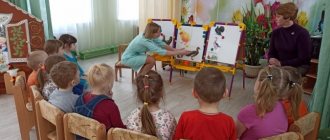Many parents think about whether their child needs a speech therapist when it’s time to go to first grade. And something similar happens in the case when the presence of pronounced speech defects is obvious, which are difficult not to notice. Of course, there are also very attentive parents who, already at an early age, notice their baby’s incorrect pronunciation of various sounds. However, at an appointment with a specialist, it turns out that the child’s development is appropriate for his age and there is no reason for concern.
So how can you figure out whether you need to worry and go to a pediatric speech therapist, or whether the child’s speech is developing in accordance with age?
What are the causes of speech impairment
Speech is one of the most important mental functions of a person, necessary for successful socialization and communication with other people. When assessing the general psychophysical development of a child, pediatricians always pay attention to the level of speech development.
For normal speech development in a child, the following is necessary:
- normal functioning of the central nervous system (CNS);
- no hearing impairment;
- normal vision;
- sufficient active verbal communication with the child from adults, especially in the family.
If we talk about the ability to correctly pronounce sounds, it is necessary to remember about the development of the child’s speech apparatus itself. The speech apparatus includes: lips, teeth, tongue (the correct length of the frenulum), small tongue, hard palate, nasal cavity, epiglottis and the larynx itself with vocal cords, trachea, bronchi and lungs (after all, the source of sound production is mostly a stream of air). Therefore, it is not surprising, for example, that with a respiratory disease, the timbre of the voice and the ability to pronounce sounds change, up to the complete absence of the voice. A dental problem can make it difficult to understand even the speech of an adult.
Having understood the necessary conditions for the formation of correct speech, speaking about speech disorders, we can identify the reasons for their formation.
- Congenital (cerebral palsy, abnormal development of the nervous system due to intrauterine infections, hypoxia) and acquired disorders of the central nervous system (infections, injuries).
- Hearing impairments – again, both congenital (due to impaired formation of the hearing organ or the functioning of the central nervous system) and acquired (infections, injuries).
- Visual impairments - by analogy with the organ of hearing - are congenital and acquired.
- Anatomical or physiological dysfunction of the organs of the speech apparatus. There can be many reasons - from a short frenulum of the tongue, which limits its movement, to disturbances in the activity of the nervous system, causing tension in the muscles of the maxillofacial area.
- Insufficient communication with the child in the family, speech therapy problems in adult family members.
Having understood the causes of speech defects, we see that in the presence of physical pathologies, parents cannot qualitatively influence the recovery processes, except for carefully following doctors’ orders.
But if we are talking about speech disorders associated with communication problems in the family, then the aggravation of these speech problems can be avoided by establishing a psychological climate in the family and sufficient communication with the child. In such situations, such children and their parents will be advised to consult a psychologist.
When do you need a speech therapist?
“If a child at a very early age (up to one year) does not have humming and babbling (sounds like “khkhkhh”, “gygy”, “agu”, “agi”, then repeated syllables “didi”, “gigi”, “bubu”, “tata”), then already at the age of 1 year it is worth contacting a speech therapist and receiving individual recommendations, explains speech therapist Elena Eremina. – It is also necessary to consult a neurologist and speech therapist if the child has:
- at the age of 2 years there are too few words, no phrases or the child does not speak at all; if the child does not say simple sounds or replaces them with others (for example, “K” is replaced by “T”);
- at the age of 3 years, the child speaks his “own” language, and a lot and actively, but there are almost no understandable and simple words; or the baby understands everything, but doesn’t want to talk - “very stubborn”; if you are alarmed by a strong difference in the child’s speech compared to the speech of his peers;
- at the age of 4–5 years, the child’s speech is unclear, blurred, he speaks slurred, does not pronounce many sounds; He speaks many sounds softly: “kisya”, “shapka”, “tray”, “lampotka”. The reasons for this may be either dysarthria, which will be identified by a speech therapist, or psychological problems in which the child attracts the attention of adults.”
At the age of over 6 years, the child’s phonetic system is fully formed, so there should be no problems with sound pronunciation. According to speech therapist Elena Eremina, the following reasons may be the reason for contacting a speech therapist:
- the child begins to speak hesitantly, repeats the first sounds, syllables, words, and stutters;
- cannot answer a question, has difficulty learning poems, cannot remember and retell a story, rearranges or skips syllables in long words;
- The child has problems with writing at school.
Why do you need a speech therapist? Consultation on speech therapy on the topic
Why do you need a speech therapist?
And in fact, who are speech therapists and most importantly, what do they do? Many people believe that speech therapists are those who “teach you how to say the letter R correctly.” Of course, these people are partially right, but this is not all that a speech therapist does.
Yes, we teach how to pronounce sounds correctly (and not only R), but at the same time we develop coherent speech, fine motor skills, learn how to correctly generalize objects, distinguish different sounds by ear...
You may ask: why is this necessary? But every mommy and every daddy wants his child to be the best and, of course, to do well at school. And if the speech therapist does not overcome all the difficulties that arose in kindergarten in time, these difficulties will haunt the child at school.
If he doesn’t know how to tell a beautiful and correct story, it will be difficult to learn history, geography, in short, all those sciences that require retelling.
If he cannot distinguish sounds by ear, he will have difficulties with the Russian language, he will confuse letters in writing, and it will be difficult to learn to read. If your fingers are not developed, it will be difficult to learn to write at all. If he cannot generalize, he will have problems with thinking, and therefore with mathematics.
And, of course, if a child does not pronounce all the sounds of our native language, he will inevitably have problems in communication, complexes will arise that will prevent him from fully revealing his natural abilities and intellectual capabilities.
Thus, the task of a speech therapist is to help the child overcome all difficulties that arise in a timely manner.
What is the role of the family and parents in overcoming speech disorders in children? Don’t think that speech defects will disappear on their own over time. To overcome them, systematic, long-term correctional work is necessary, in which parents play a significant role, since the child spends more time at home with people close to him. Parents should form the correct attitude towards a child’s speech disorder:
- do not scold the child for incorrect speech; — unobtrusively correct incorrect pronunciation; - do not focus on hesitations and repetitions of syllables and words; - to ensure that the child has a positive attitude towards classes with teachers.
In addition, parents themselves must learn how to perform and show their child simple articulation exercises to prepare the speech apparatus for correct sound pronunciation. Parents should pay special attention to homework. The speech therapist writes down advice, comments and recommendations on an individual basis.
It is necessary to take into account the importance of the child’s speech environment. Parents should monitor the correctness of their own speech. Speech must be clear, clear, competent, and expressive. At home, read poems, fairy tales, riddles, and sing songs more often. On the street, watch birds, trees, people, natural phenomena, discuss what you see with your children. Avoid frequent viewing of television programs, especially adult content. Play with your child, establish verbal and emotional contact. I would like to note that only in close cooperation between family and teachers can good, high-quality and relatively quick results be achieved in the correction and development of a child’s speech. Continuity in the work of the family and kindergarten is carried out through individual consultations, visual information for parents and in classes that parents can attend by agreement with teachers.
How can a speech therapist help a child?
Contrary to popular belief that the task of a speech therapist is only to correctly produce sounds, the work of this specialist has a broader scope of the mental and physiological functions of the child’s body associated with the formation of speech skills.
Individual speech therapy sessions are aimed at developing speech in general.
Beautiful coherent speech is formed on the basis of such concepts and skills as:
- speech memory;
- the ability to perceive sounds by ear and reproduce them;
- the ability to form new words and use endings correctly;
- link words into a sentence;
- build coherent texts from sentences, united by meaning and logic.
Of course, the undoubted benefit of a speech therapist’s lessons is that an individual approach is applied to the child. But it is important for parents to remember that it is the parental involvement in the process that determines how successful the correction of speech disorders will be. Moreover, we are not talking about adult children. The speech therapist's patients are mostly children of senior preschool age, and they simply need parental help. Correction of defects in the pronunciation of sounds occurs not only during individual lessons with a speech therapist, but also in the child’s daily life through participation in communication with adult family members and performing special speech therapy exercises.
The main tasks of a speech therapist:
- study of speech defects and the causes that gave rise to them;
- development of methods and programs necessary to correct speech disorders;
- support in the development of language (languages);
- programs for the development and maintenance of languages
What should parents be concerned about?
The help of a professional speech therapist is necessary if your child:
- by two to three months it is no longer humming;
- by six to seven months no longer babbles;
- by the first year he does not utter words;
- by two years of age does not form short phrases of 2-3 words;
- by the age of three, does not make sentences of 5 or more words, does not remember short poems;
- By the age of four, he cannot formulate sentences correctly and does not ask hundreds of questions a day!
- By the age of five, he cannot speak in whole complex sentences, does not remember poems, fairy tales, or invent his own stories.
At the age of 3, it is recommended that all children undergo a consultation with a speech therapist, regardless of whether they have speech disorders or not.
Error!
Sometimes parents are sure that their child is developing normally, he is just lazy or stubborn, and does not want to talk or read. What adults perceive as stubbornness or laziness may turn out to be the beginning of serious disturbances in mental and mental development. This will definitely be noticed by a professional speech therapist, who can refer you to a neurologist or psychologist for consultation.
Note!
Often children who have speech impediments also eat poorly. It is difficult for them to eat hard vegetables or fruits, such as carrots or apples, or chew a piece of meat. Weak muscles of the upper and lower jaw not only make it difficult to absorb food, but also prevent the development of the articulatory apparatus. Speech therapist's advice: give your child crackers more often; whole vegetables and fruits; Learn to eat meat as a whole piece; do not try to cut foods for babies into small pieces.
How to speed up the correction process
To successfully correct speech defects, you will need not only the help of experienced speech therapists, but also, possibly, a visit to a child psychologist. But even with all the involvement of highly professional specialists, the role of parents is very important. Compliance with certain rules by parents will help the child quickly overcome the difficulties that arise:
- doing homework regularly;
- regular attendance at speech therapy lessons;
- responsible implementation of the speech therapist’s instructions;
- compliance with doctor's recommendations, including drug treatment;
- controlling the child's speech.
It should be remembered that children learn information that they find interesting and perform tasks that they enjoy doing. Therefore, do not turn speech therapy classes into a boring learning process, introduce an element of play and participate in them with sincere interest.
Sofia Rogozinskaya




